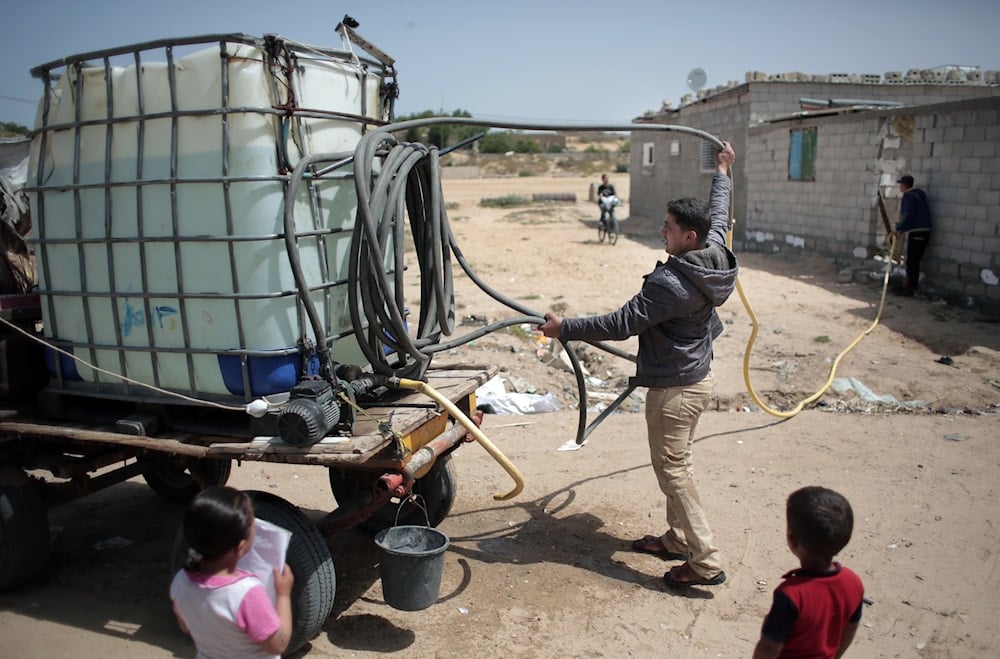Surge in water-related violence led by Israeli violence on Palestine
As "Israel" continues its war on the Gaza Strip, a quarter of all water-related violent acts, including the destruction of dams, pipelines, and treatment plants, occur in the Gaza Strip and West Bank.
-

A Palestinian man sells drinking water in the Khan Younis refugee camp, southern Gaza Strip, on April 16, 2016. (AP)
Israeli assaults on Palestinian water supplies in the occupied West Bank and Gaza Strip made up 25% of all water-related violence worldwide in 2023, as global conflicts over scarce resources intensified, new research showed.
In 2023, nearly 350 water-related conflicts were recorded globally, marking a 50% increase from 2022, which in itself was a record year. This data come from the Pacific Institute, a California-based nonpartisan think tank monitoring water-related violence. The Guardian reported that the incidents included assaults on dams, pipelines, wells, and treatment facilities, as well as attacks on workers, public unrest, disputes over water access, and the strategic use of water as a weapon in warfare.
Water-related violence has been steadily increasing since 2000 but has surged dramatically in recent years due to the climate crisis and worsening scarcity, which are intensifying long-standing conflicts over land, ideology, religion, economics, and sovereignty, while also fueling new disputes. According to the Water Conflict Chronology, only 20 water conflicts were documented in 2000, highlighting the sharp escalation over the past two decades.
Water-related assaults on Palestine
As reported by The Guardian, the water-related assaults in the Middle East made up 38% of last year’s global total, largely due to attacks on Palestinian water supplies and infrastructure in the occupied territories. This data comes from a tracker that compiles information from news reports, eyewitness accounts, UN reports, and various databases.
In 2023, Israeli settlers contaminated and destroyed water wells, pumps, and irrigation systems on 90 occasions, averaging over seven water-related acts of violence each month.
Armed Israeli settlers prevent Palestinian farmers from accessing water at Al-Auja spring near Jericho, a vital resource for the local Palestinians that settlers are attempting to steal. pic.twitter.com/Jkb50T4T3O
— Quds News Network (@QudsNen) August 19, 2024
Water contamination in Gaza Strip
Under the pretext of destroying Hamas' "communication system", the Israeli occupation destroyed much of the water and wastewater infrastructure in Gaza during the ongoing war on Gaza.
In November, Israeli airstrikes partially destroyed solar panels and other infrastructure providing energy for the EU-supported Gaza Central wastewater treatment plant, which served 1 million people. In another attack, the Israeli occupation military began pumping seawater “ruining the basic conditions for life in Gaza” – an element of the crime of genocide, a senior hydrologist told The Guardian in December.
Water-related assaults in West Bank
In the West Bank, a significant portion of the water-related violence is connected to Israeli usurpation and settlement activities, which were deemed unlawful by the International Court of Justice in a key advisory ruling.
In one documented case from September, Israeli settlers from the Shaarei Tikva settlement reportedly pumped wastewater onto Palestinian agricultural lands east of Qalqilya, causing damage to olive trees and crops.
The Israeli occupation pumped wastewater from the settlement located on the lands of the villages of “Azoun Atma - Beit Amin”, southeast of Qalqilya, to ruin Palestinian agricultural lands planted with olives. pic.twitter.com/dnWXQkVFGK
— V PALESTINE 🇵🇸 (@V_Palestine20) September 24, 2023
Also, in November, Israeli settlers reportedly demolished homes, destroyed a school’s water tanks and pipeline, and uprooted dozens of young olive trees in the occupied city of al-Khalil.
Today we lost 4 old olive trees j. Hebron, pic.twitter.com/NjW1I3BRlj
— Issa Amro عيسى عمرو 🇵🇸 (@Issaamro) September 6, 2023
Read next: 95% of Gazans lack safe drinking water, risking disease

 3 Min Read
3 Min Read








